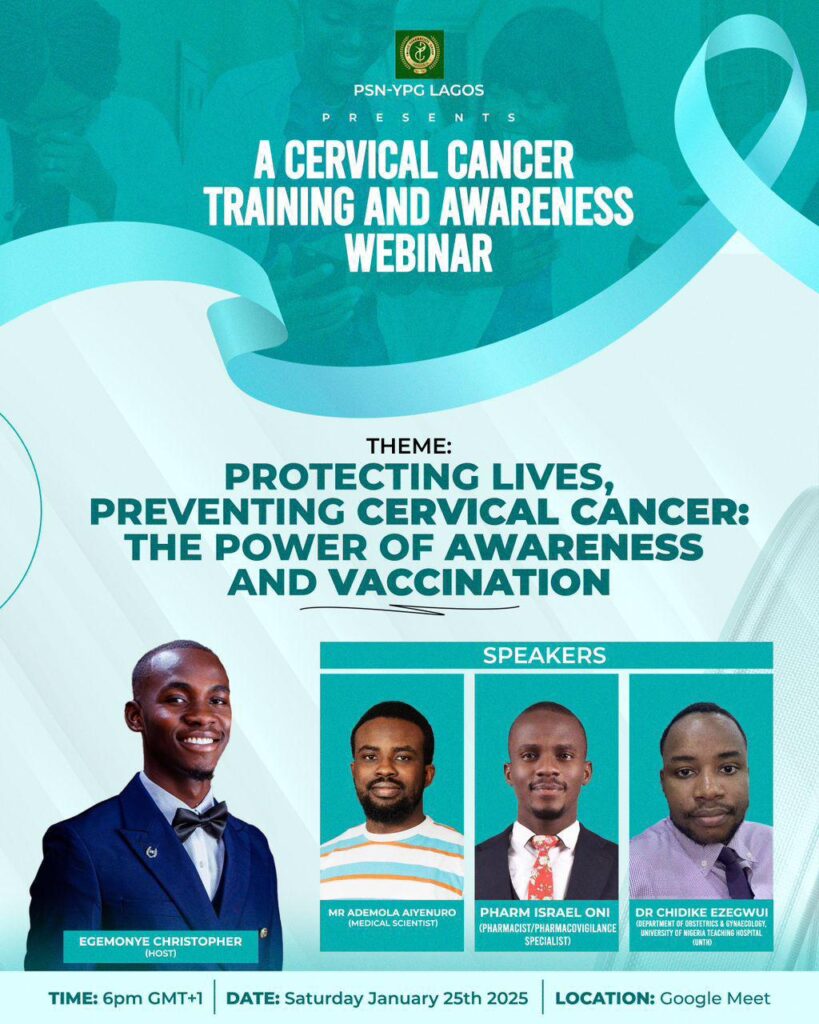Cervical cancer remains a pressing public health concern, particularly in regions where awareness, prevention, and early detection strategies are limited. To shed light on this issue, we recently hosted a successful webinar titled “Cervical Cancer: Prevention, Diagnosis, and Management.” The event brought together distinguished experts who shared invaluable insights on cervical cancer, its prevention, and the role of healthcare professionals in managing the disease.

Expert Speakers and Key Takeaways
The webinar featured three renowned speakers, each focusing on critical aspects of cervical cancer:
Dr. Chidike Ezegwui – Understanding Cervical Cancer: Causes, Symptoms, and Diagnosis

Dr. Ezegwui, from the Department of Obstetrics and Gynaecology at the University of Nigeria, Nsukka, laid the foundation with an overview of cervical cancer, addressing:
- Causes and Risk Factors: Dr. Ezegwui identified key risk factors, including HIV infection, multiple sexual partners, early onset of sexual activity, smoking, and the use of oral contraceptives.
- Clinical Features: He highlighted symptoms such as post-coital bleeding, back pain, pelvic pain, leg swelling, and bladder issues, urging women to seek medical advice promptly if these symptoms arise.
- Prevention and Screening: Dr. Ezegwui underscored the importance of preventive measures like HPV vaccination, male circumcision, and sex education. He emphasized regular screening, with Pap smears recommended for women aged 21–29 and HPV DNA tests for women aged 30–65.
Pharmacist Israel Oni – The Pharmacist’s Role in Cervical Cancer Prevention and Management

Pharmacist Oni offered a unique perspective, focusing on the critical role pharmacists play in the fight against cervical cancer:
- Public Education: Community and hospital pharmacists serve as key advocates for HPV vaccination and cervical cancer awareness.
- Pharmacovigilance: Pharmacists play an essential role in monitoring the safety and efficacy of HPV vaccines, ensuring public confidence in vaccination programs.
- Prenatal Counseling: Pharmacists can contribute to preventive care by educating expectant mothers on cervical cancer risk factors and screening.
- Treatment Support: Pharmacists assist patients undergoing chemotherapy or radiation therapy with pharmaceutical care, managing side effects and ensuring adherence to prescribed regimens.
Mr. Ademola – The Immune System’s Role in HPV Infection and Cervical Cancer Development

As a PhD candidate in Pathology at the University of Cambridge, Mr. Ademola provided cutting-edge insights into the intersection of HPV and the immune system:
- Immune Evasion Mechanisms: He explained how HPV downregulates MHC peptides, compromising the body’s ability to mount an effective immune response.
- Impact of HIV Co-Infection: He highlighted the increased risk of cervical cancer in women with HIV, emphasizing the importance of targeted interventions in vulnerable populations.
- Research and Practice: Mr. Ademola discussed how his research could shape future prevention and treatment strategies, particularly immune-focused interventions.
Questions from the Webinar
The Q&A session was highly engaging, with attendees posing thought-provoking questions that deepened the discussion. Here are a few highlights:
- How does the HPV virus affect the immune system?
The virus downregulates MHC peptides, compromising the immune system’s ability to respond effectively. - What are five risk factors for cervical cancer?
Risk factors include HIV infection, multiple sexual partners, other sexually transmitted infections, early onset of sexual activity, smoking, and contraceptive use. - What are the clinical features of cervical cancer?
Key symptoms include post-coital bleeding, back pain, pelvic pain, leg swelling, and bladder issues. - What are the primary, secondary, and tertiary prevention methods for cervical cancer?
- Primary Prevention: Male circumcision, vaccination, sex education, and promoting healthy sexual behaviors.
- Secondary Prevention: Regular Pap smears and HPV DNA testing.
- Tertiary Prevention: Managing cervical cancer through treatment and rehabilitation.
Looking Ahead
The webinar served as a powerful reminder of the importance of collaboration across disciplines in addressing cervical cancer. From the latest medical insights to the pivotal role of pharmacists and groundbreaking research into immune responses, the event underscored the multi-faceted approach required to combat this disease effectively.
We extend our heartfelt gratitude to our speakers and attendees for making the event a success. Together, we can continue to raise awareness, promote prevention, and improve outcomes for women affected by cervical cancer.
Prepared by Egemonye Christopher
PSN-YPG Lagos General Secretary